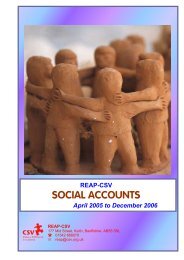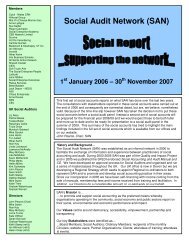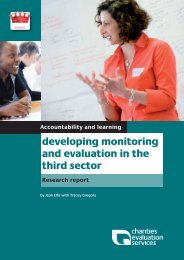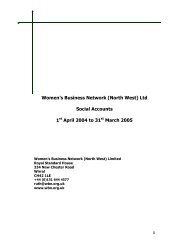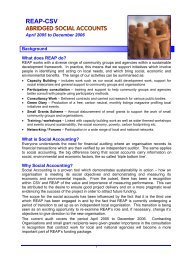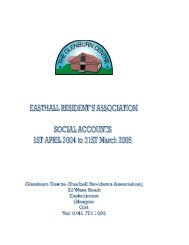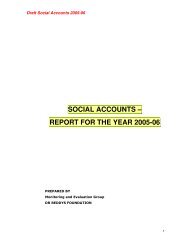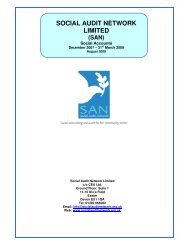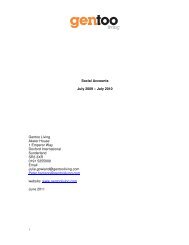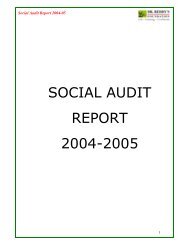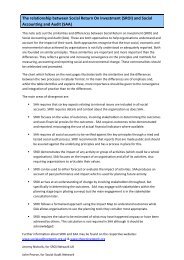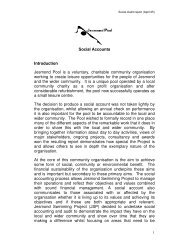CDS Summary Paper - The Social Audit Network
CDS Summary Paper - The Social Audit Network
CDS Summary Paper - The Social Audit Network
Create successful ePaper yourself
Turn your PDF publications into a flip-book with our unique Google optimized e-Paper software.
<strong>Social</strong> Accounting and <strong>Audit</strong> Pilot Initiative: A partnership betweenCo-operative Development Scotland (<strong>CDS</strong>) and the<strong>Social</strong> <strong>Audit</strong> <strong>Network</strong> (SAN)<strong>Summary</strong> <strong>Paper</strong>Co-operative Development Scotland (<strong>CDS</strong>) and the <strong>Social</strong> <strong>Audit</strong> <strong>Network</strong> (SAN) worked in partnership toimplement a pilot initiative which introduced social accounting and audit to six co-operative enterprises in Scotland.Co-operative Development Scotland (<strong>CDS</strong>) promotes the development of successful co-operative enterprises acrossScotland. <strong>The</strong>y work closely with key partners and aim to demonstrate the personal, social and economic advantagesof co-operatives. It also directly supports the growing co-operative sector by raising the profile of co-operatives,helping the development of new co-operatives and carrying out research.<strong>The</strong> <strong>Social</strong> <strong>Audit</strong> <strong>Network</strong> (SAN) is company operating throughout the UK. It promotes and supports socialaccounting as the preferred means whereby enterprises report on their social, environmental and economicperformance and impact. In Scotland, SAN operates through one of its founder members, CBS <strong>Network</strong>.<strong>The</strong> participating co-operative enterprises ranged in size, sectoral activity and location. <strong>The</strong>y were: West WhitlawburnHousing Co-operative, Highland Home Carers, Loch Fyne Oysters, Highland Wholefoods, Scotwest CreditUnion and the WISE Group.<strong>The</strong> pilot initiative involved a series of tailored workshops and regular visits to the organisations with specifieddeadlines for the completion of practical work carried out by the co-operatives. <strong>The</strong> pilot initiative lasted 18 monthsand started, after preparatory visits to all participating organisations, with an initial workshop in September 2007 andfinished with a final event in March 2009.<strong>Social</strong> Accounting and <strong>Audit</strong> allows a co-operative or social enterprise to build on its existing monitoring,documentation and reporting systems to develop a process whereby it can account fully for its social, environmentaland economic impacts, report on its performance and draw up an action plan to improve on that performance. Throughthe social accounting and audit process an organisation can understand its impact on the surrounding community andon its beneficiaries and build accountability by engaging with its key stakeholders. In this way it can prove its valueand improve its performance. Basically, social accounting involves clarifying what a co-operative or social enterprisedoes, what it is trying to achieve and who it is working with. <strong>The</strong>n, on the basis of this, it collects quantitative andqualitative information and data which relates to its overall objectives and underlying values. This usually lasts oneyear and runs concurrent with the financial year. At the end of the social accounting year the organisation brings allthe information together in the form of social accounts that are independently audited and after revisions the socialaccounts form a <strong>Social</strong> Report.All six of the participating co-operatives have followed the social accounting process and written social accounts. Fourof the six co-operatives have been fully audited. A final evaluation report reflecting on the pilot initiative has beenwritten reflecting consultations with the co-operatives and interviews with four key people working in the co-operativesector in Scotland. A copy of this full report can be obtained on request from <strong>CDS</strong> and includes the main findings and arecommendation.<strong>The</strong> overall benefits of social accounting for the co-operative sector were reported being:• “massive potential benefits…for organisations that seek to deliver mainstream services in a competitiveenvironment whilst delivering social value” as social accounting allows a “clear demonstration of the valueadded”.• all organisations should keep social accounts “as it has value in seeing what is being achieved and accountingfor what they do”.• the sector “could definitely benefit in getting involved with this – they need to start telling a wider audience aboutthe good work that they are doing over and above reporting on those measures that the regulators demand ofthem”.
• a general feeling amongst the participants that social accounting and audit is of benefit and should be practisedmore widely as it distinguishes co-operatives from traditional companies and makes “one think about the valuesand principles”.More specifically….Benefits to the co-operatives• Valuable tool for communicating benefits of cooperativesand promotion• Brings rigour to performance and impactmeasurement• A way of differentiating the co-operative fromcompetitors• Provides more concrete evidence of what is beingachieved• Helps to improve management systems andreporting mechanisms and identified issues thatneeded addressed• Identifies “gaps” in data being collected and whatis really relevant• Provides a framework for checking on andreviewing performance and impact and also“brings information together”• Improves communication with the workforce• Reduces time taken in preparing annual reports• Results in a better understanding of the cooperativeas a wholePersonal staff benefits• “Excellent opportunity for staff development” andcan provide a value staff perspective on the cooperative• Improves personal identity with the company andan increased sense of “belonging” to the cooperative• Better understanding of social; accounting andthe area of performance and impact measurement• Learning a range of different skills• Became better at “listening” to stakeholders• Better communications between staff andmanagement and the management ofcommunicationsDis-benefits to the co-operatives• SAA is time and resource intensive – this was by far themost mentioned dis-benefit (but also mentioned was thatmuch of the monitoring and reporting is required anywayand the first time round will take longer)• SAA can open up the co-operative to external scrutiny ofdetails not usually made public• Causes difficulties in accessing information within the cooperative• Arguably have set “too high a standard for future socialaccounts”Problems carrying out social accounting• Internal communication within the co-operative due to alack of overall understanding of social accounting andaudit• Getting information and data from other departmentswithin the co-operative• Time pressures to complete the social accounts• Disagreements around some of the processes and howto achieve them – in particular around the scopeFor some of the co-operatives there were a number of reported subsidiary or spin-off benefits from being part of thispilot initiative not necessarily directly related to social accounting. <strong>The</strong>y are that the pilot programme……brought together quite different co-operatives, working in quite different sectors and structured in quitedifferent ways in a shared experience which many found interesting and enjoyable;…introduced different co-operatives to each other enabling them collaborate on possible future projects andsharing information not directly related to the pilot initiative; and…encouraged the co-operatives to locate information that they already had but had not used before andinclude it in their social accounts.Contacts:SAN in Scotland, CBS <strong>Network</strong>, <strong>The</strong> Melting Pot, Thorn House, 5 Rose Street, Edinburgh EH2 2PR; 0131 243 2636;info@cbs-network.org.uk; www.cbs-network.org.uk; www.socialauditnetwork.org.ukCo-operative Development Scotland, Spectrum House, 1a North Avenue, Clydebank Business Park, Glasgow G812DR; Tel 0141 951 3055; info@cdscotland.co.uk; www.cdscotland.co.uk
Case study: Highland Home CarersHighland Home Carers is to produce annual 'social accounts' after the success of a project funded by CooperativeDevelopment Scotland.<strong>The</strong> Inverness-based homecare provider, which is owned by its 160 employees, is already working on itsthird annual social audit.<strong>The</strong> process involves interviewing service users and their families, employees and funders to help measurethe company's wider social, economic and environmental performance.<strong>CDS</strong> introduced a number of co-operative businesses to social accounting in 2008 as part of an initiativewith the <strong>Social</strong> <strong>Audit</strong> <strong>Network</strong>, which helps companies throughout the UK prepare social accounts and havethem independently audited."<strong>The</strong> first benefit was that it has enabled us to have a much better independent perspective of our serviceand how we might improve things," explains Stephen Pennington, Managing Director of Highland HomeCarers."In the first year, there was a fair amount of feedback that our communication systems weren't as good asthey might be. We made some changes in our structures to try and tackle that, and it appears as if we'renow getting it right. We're subject to regulation by the Care Commission, and in their most recent report,they have graded us at 'Level 6 Excellent' on our quality assurance systems and processes, which involveservice users, carers, staff and stakeholders to assess the quality of service we provide. This is what we doin our social accounting."Topics covered in the company's social accounts include quality of service provision, performance againstcorporate objectives and mission statement, staff training, treatment at work, communication and views ofemployee ownership. Interviews, focus groups and questionnaires were used to gather responses. Forexample, 97% of service users said they were comfortable and confident with Highland Home Carers' staff,while 68% of employees believed the company met its objective of being a fair or good employer either wellor very well.<strong>The</strong> <strong>Social</strong> <strong>Audit</strong> <strong>Network</strong> recommends producing social accounts at least every two years, but HighlandHome Carers is committed to producing them every year because the information produced is so valuable."It has definitely given us an edge with customers who purchase our services," Stephen Pennington says. "Ifthat helps us get an excellent rating from the Care Commission, it is bound to influence people."Sarah Deas, <strong>CDS</strong> Chief Executive, said: "<strong>The</strong>re is clear evidence to suggest that social accounting can helpco-operative and employee-owned businesses build long-term relationships with customers andstakeholders by demonstrating their wider impact on society. We are delighted that this has been theexperience of Highland Home Carers and we will continue to promote this approach where appropriate."



